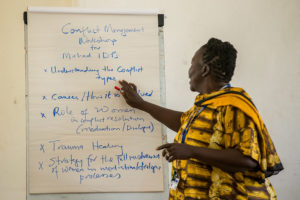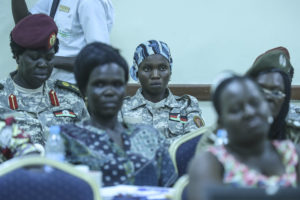“Protect women not Reputations” – Kirabo Nora, a Ugandan-African Feminist, once said.
Women who speak up on their experiences of sexual exploitation, abuse, and harassment within their workplace have been mostly silent, silenced, and unheard of until recently. In December 2019, one courageous South Sudanese woman, who was in 2015 the second secretary at the South Sudan embassy in Rome, Italy, spoke out.
She spoke of her experience of sexual harassment and abuse by her supervisor and leader-the ambassador, on social media. In a Facebook video interview through the page “Our Diversity,” she narrates the five years where he allegedly brought her unwanted gifts in the office, embarrassed, and criticized her in staff meetings when she did not respond to his advances. She accuses him of using his authority to confiscate her passport, refused to renew her diplomatic documents and withholding her salaries.
When she went to demand her salaries, he accused her of terrorism and called the police.
“They took my fingerprints, I am being treated like a criminal,” she said. “They scanned my residential diplomatic number and my CD car number plate. Now anywhere I go, any police on the roads watch me, and they know who I am, I just live here like half a prisoner,” she narrated.
Her attempts to evade the ambassador were unsuccessful when she moved houses, he still traced her and physically assaulted her in front of her two sons. She claims to have filed a formal complaint with the Ministry for Foreign Affairs and Cooperation headquarters back in Juba in 2017, but nothing was done. While her former colleagues empathize with her, the matter hasn’t been addressed administratively. On May 15, 2019, she dismissed from the diplomatic service six months before she took to social media to speak up on her ordeal.
Sex has been weaponized in public and private spheres to humiliate, coerce, and punish women.
On social media, revenge porn is a scourge where images and videos of women are shared without their consent. In South Sudan, sexual violence is a politicized instead of being a political priority to fight since the war started in 2013. The Sudan People’s Liberation Army (SPLA), recently renamed South Sudan People’s Defense Forces (SSPDF), has been accused by the UN for perpetrating gross human rights violations and sexual violence in its bid to squash the armed opposition, and all other armed opposition groups are using the same tactic.
In 2018, the United Nations Mission in South Sudan (UNMISS) recorded an alarming increase in the number of incidents and victims of conflict-related sexual violence. UNMISS documented 238 incidents involving 1,291 victims, the majority being women and girls, with ten male victims, according to the Report of the Secretary-General to the Security Council (S/2019/280) issued on March 30, 2019.

Civilians have borne the brunt of the violence in the war in South Sudan. The use of sexual violence in this war was brought to international attention through the Terrain Case, in which 11 military personnel accused of rape and murder were tried and convicted. The cases of sexual violence were initiated by the SPLA military tribunals to address the issue within its ranks. A recent alleged physical assault of two female journalists in Bilpam SSPDF’s HQs by a senior SSPDF general emphasizes the need for a change in attitude and culture in the army to address violence against women in the workplace.
South Sudan is a profoundly patriarchal society with an uneven distribution of gendered power. Years of conflicts have further entrenched patriarchy in all spheres of life, and it’s firmly rooted in the state structure.
For instance, in the case of the “Katiba Banat,” the only female battalion formed within the SPLA during the liberation struggle was subsequently dissolved, with most of its members being married off to SPLA commanders. Years after attaining independence, the institutionalization of Sexual and Gender-Based Violence (SGBV) is a problem for the government, non-governmental organizations (NGOs), and private sectors where there are minimal safeguards to ensure the protection of women.
In the NGOs, in 2018, a whistleblower from Oxfam highlighted the vulnerability of women working within South Sudan’s humanitarian sector. While many humanitarian reports stress the plight of the South Sudanese women, the policies focus mostly on abuses that may arise by staff against citizens. There is an urgent need to address sexual harassment, exploitation, and abuse, which exists in formal institutions and settings.

In South Sudan, according to the UNESCO Institute of Statistics, the female literacy rate is low at 19.2 percent, which means there are fewer women employed in formal institutions. There are legal affirmative action clauses to address the inequality; however, the few women have to work more than twice as hard in these male-dominated institutions. There is a handful number of women who have occupied positions of power and influence. Still, gender inequality is deeply ingrained in the institutional structure where women hold low ranking positions, doing menial labor such as secretarial, receptionists, etc.
As a result of gender and power inequality, sexual harassment, exploitation, and abuse are common with no or minimal repercussions for the perpetrators. Discussion on SGBV in South Sudan is centered around the use of sexual violence mostly against women as a weapon of war and exploitation of vulnerable women in communities most affected by the conflict or natural disasters, displacement camps, or Protection of Civilian Sites by service providers with little focus on formal institutions.
Sexual harassment, exploitation, and abuse are not confined only to conflict situations; in formal institutions, it is so normalized.
Women who defy patriarchy and make their way to higher positions of power and influence against all the odds are often despised with allegations of ‘having slept their way through’ undermining women’s competence and decades of fighting for gender equality.
The case against the ambassador in Rome puts a face to sexual abuse in South Sudan’s formal institutions. Attempts to speak up or highlight the issue are often met with threats so victims fear retaliation. Often sexual harassment, exploitation, and abuse in the workplace are downplayed by calling it ‘drama or relationship issues’ and so often, most people avoid discussing it and stigmatize the victim instead. It takes a lot for women to speak up, but it takes even more courage to speak if your abuser is not only your supervisor but is also of a certain status in society.
Public institutions such as ministries must set the pace in addressing institutionalized violence against women and create safe working environments for all. The South Sudan Ministry of Foreign Affairs and International Cooperation should investigate the allegations of sexual harassment and abuse at the Rome embassy and put in place justice measures. Preventing requires not only education and legislative frameworks on sexual offenses but also actual implementation of those policies and clear response mechanisms that protect the victims and hold accountable the abusers.
The reported incident at the South Sudan embassy should be a wakeup call for all institutions, public, private, and NGOs in South Sudan to ensure the institutionalization of specific safeguarding policies and open reporting lines. Human Resource efforts to prevent sexual harassment, exploitation, and abuse tend to create broader equality across an organization for everyone because it values personnel based on performance and not whom you know or anything else.
Civil society organizations, especially South Sudanese women’s rights organizations and activists, have a huge task ahead to push and advocate for these safeguarding policies in the workplace. The efforts must ensure South Sudanese women, the majority of the victims, are protected both in formal institutions and formal institutional settings and in broader society.
Feature Photo: UN Women/Jaana Oikarinen

Great job Aluel